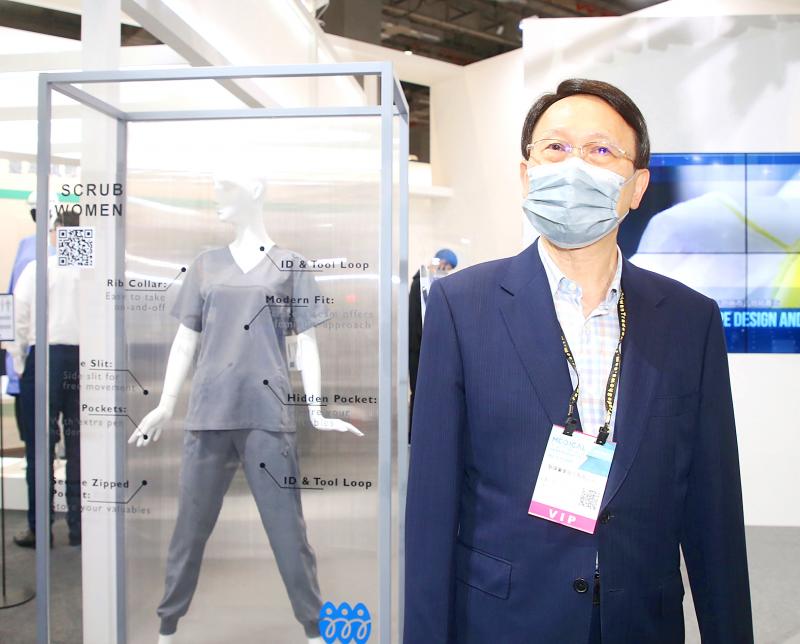Investment advisory agencies last week issued a “buy” rating for Makalot Industrial Co Ltd (聚陽實業) after the ready-to-wear apparel maker reported better-than-expected pretax profit for last quarter.
The company on Monday last week reported that pretax profit last month rose 9.9 percent from a month earlier and 5.2 percent year-on-year to NT$383.65 million (US$13.27 million), on revenue of NT$2.69 billion.
Its third-quarter pretax profit increased 104.6 percent quarterly and 21.7 percent annually to NT$1.03 billion, on revenue of NT$8.03 billion.

The company’s pretax gross margin was 23.5 percent last quarter, up from 21.9 percent the previous quarter, backed by further optimization of its product mix and increasing demand for high-margin products such as casual home wear and mask covers.
Last quarter’s results beat estimates by Daiwa Capital Markets Inc, thanks to its improving product mix, well-controlled operating expenses and greater order allocation from brand clients, it said in a note.
Makalot counts GAP Inc, Fast Retailing Co’s GU sub-brand, Kohl’s Corp, Target Corp, Walmart Inc and Hanesbrands Inc among its major brand clients.
The companies have been accelerating their consolidation of suppliers amid the COVID-19 pandemic and the US-China trade dispute, analysts said.
Makalot is expanding production lines and recruiting more workers in its Vietnamese and Indonesian plants to manufacture orders for Target and GAP, while its Chinese and Cambodian plants would focus on GU orders, analysts said.
Makalot also benefits from strong demand for products related to epidemic prevention and the company has already begun producing protective gowns and isolation clothing.
During the Medical Taiwan International Medical, Health and Care Exhibition held earlier this month in Taipei, Makalot said that anti-epidemic materials are in high demand and the company is targeting European and American markets where the pandemic has not been alleviated.
“We see the trend of product mix improvement continuing in the second half of 2020 and in 2021, on top of [Makalot’s] tightening capacity and rising order-share gain from key clients such as Target, Gap and Fast Retailing,” Daiwa said in a note.
With clear order visibility, the company is expected to see revenue grow up to 5 percent year-on-year in US dollar terms, with shipments forecast to increase by a high single-digit percentage from a year earlier, Daiwa said.
“We upgrade Makalot to buy from outperform as we believe it should be the key beneficiary of vendor consolidation in the garment space and on valuation grounds,” Daiwa said. “We lift our 12-month target price to NT$230, from NT$222.”
In light of the company’s strong third-quarter results, Jih Sun Securities Investment Consulting Co (日盛投顧) also revised its revenue and earnings per share forecasts for this year to NT$25.34 billion and NT$9.23 respectively, up from its previous estimates of NT$25.17 billion and NT$8.95.
“Considering the positive outlook from its clients’ recent financial guidance and the potential growth in orders during the first half of 2021, we maintain the buy rating with a target price of NT$234,” Jih Sun said in a note.
Makalot shares closed at NT$190 in Taipei trading on Friday. They have risen 20.63 percent since the beginning of this year.

Taiwan’s exports soared 56 percent year-on-year to an all-time high of US$64.05 billion last month, propelled by surging global demand for artificial intelligence (AI), high-performance computing and cloud service infrastructure, the Ministry of Finance said yesterday. Department of Statistics Director-General Beatrice Tsai (蔡美娜) called the figure an unexpected upside surprise, citing a wave of technology orders from overseas customers alongside the usual year-end shopping season for technology products. Growth is likely to remain strong this month, she said, projecting a 40 percent to 45 percent expansion on an annual basis. The outperformance could prompt the Directorate-General of Budget, Accounting and

Two Chinese chipmakers are attracting strong retail investor demand, buoyed by industry peer Moore Threads Technology Co’s (摩爾線程) stellar debut. The retail portion of MetaX Integrated Circuits (Shanghai) Co’s (上海沐曦) upcoming initial public offering (IPO) was 2,986 times oversubscribed on Friday, according to a filing. Meanwhile, Beijing Onmicro Electronics Co (北京昂瑞微), which makes radio frequency chips, was 2,899 times oversubscribed on Friday, its filing showed. The bids coincided with Moore Threads’ trading debut, which surged 425 percent on Friday after raising 8 billion yuan (US$1.13 billion) on bets that the company could emerge as a viable local competitor to Nvidia

BARRIERS: Gudeng’s chairman said it was unlikely that the US could replicate Taiwan’s science parks in Arizona, given its strict immigration policies and cultural differences Gudeng Precision Industrial Co (家登), which supplies wafer pods to the world’s major semiconductor firms, yesterday said it is in no rush to set up production in the US due to high costs. The company supplies its customers through a warehouse in Arizona jointly operated by TSS Holdings Ltd (德鑫控股), a joint holding of Gudeng and 17 Taiwanese firms in the semiconductor supply chain, including specialty plastic compounds producer Nytex Composites Co (耐特) and automated material handling system supplier Symtek Automation Asia Co (迅得). While the company has long been exploring the feasibility of setting up production in the US to address

OPTION: Uber said it could provide higher pay for batch trips, if incentives for batching is not removed entirely, as the latter would force it to pass on the costs to consumers Uber Technologies Inc yesterday warned that proposed restrictions on batching orders and minimum wages could prompt a NT$20 delivery fee increase in Taiwan, as lower efficiency would drive up costs. Uber CEO Dara Khosrowshahi made the remarks yesterday during his visit to Taiwan. He is on a multileg trip to the region, which includes stops in South Korea and Japan. His visit coincided the release last month of the Ministry of Labor’s draft bill on the delivery sector, which aims to safeguard delivery workers’ rights and improve their welfare. The ministry set the minimum pay for local food delivery drivers at